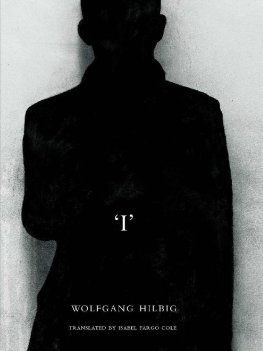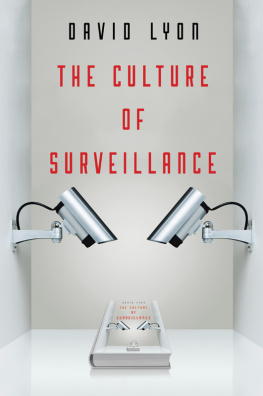Wolfgang Hilbig - 'I'
Here you can read online Wolfgang Hilbig - 'I' full text of the book (entire story) in english for free. Download pdf and epub, get meaning, cover and reviews about this ebook. year: 2015, publisher: Seagull Books, genre: Prose. Description of the work, (preface) as well as reviews are available. Best literature library LitArk.com created for fans of good reading and offers a wide selection of genres:
Romance novel
Science fiction
Adventure
Detective
Science
History
Home and family
Prose
Art
Politics
Computer
Non-fiction
Religion
Business
Children
Humor
Choose a favorite category and find really read worthwhile books. Enjoy immersion in the world of imagination, feel the emotions of the characters or learn something new for yourself, make an fascinating discovery.
- Book:'I'
- Author:
- Publisher:Seagull Books
- Genre:
- Year:2015
- Rating:3 / 5
- Favourites:Add to favourites
- Your mark:
- 60
- 1
- 2
- 3
- 4
- 5
'I': summary, description and annotation
We offer to read an annotation, description, summary or preface (depends on what the author of the book "'I'" wrote himself). If you haven't found the necessary information about the book — write in the comments, we will try to find it.
Wolfgang Hilbig: author's other books
Who wrote 'I'? Find out the surname, the name of the author of the book and a list of all author's works by series.
'I' — read online for free the complete book (whole text) full work
Below is the text of the book, divided by pages. System saving the place of the last page read, allows you to conveniently read the book "'I'" online for free, without having to search again every time where you left off. Put a bookmark, and you can go to the page where you finished reading at any time.
Font size:
Interval:
Bookmark:
Wolfgang Hilbig
'I'
About I (Wolfgang Hilbigs novel proposal as submitted to Fischer Verlag)
The prose piece entitled I (I envision a novel-length work of 150200 pages) is the attempt to find a literary form for the inner biography of a so-called IM (Inoffizieller Mitarbeiter). An IM the abbreviation has become almost universally familiar, at least since the collapse of the GDR that is, an Unofficial Collaborator of the State Security Service of the GDR, reflecting on his existence as such in the first person, is the protagonist of the first part of the story. Am I playing a role? the author asks himself.
As the public debates, mainly journalistic, on the subject of the Stasi seem to have brought to light little of substance about such figures, who must have existed by the hundreds of thousands, it seems possible to me that what best suits the subject is a literary form that is, a form that eschews the attempt to clarify. Indeed, so far we have had little illumination regarding the nature of IMs: this seems to be explained by the very so-called conspirative element surrounding such figures, who, after all, conduct their clarification in the dark. Reflecting on the conceptualization of such a protagonist, I asked myself a rather disturbing question: To what extent can the work of an informer be compared with the literary work of a writer? Immediately I told myself that the results are different. . but that posed the question of the extent to which a secret service, too, is dealing only with a fiction of reality; and is this not in fact its intent? I asked myself to what degree reality, in an IMs reports for his superior, must be a fiction approaching a literary fiction. Isnt an IM report also supposed to contain the greatest possible authenticity? How does an informer cope with this demand for authenticity when, in the dark of his underground work, he must forget his subjective interpretations in order to maintain his credibility? Or are the IMs superiors as a rule these superiors are able to psychologically assess the IM not even interested in authenticity any more, only in reacting to their own image of reality? Couldnt a clever informer hit upon the notion of reaching a consensus with his case officer on a fiction of reality. . on a reading of reality?
After the fall of the Berlin Wall, when several writers were exposed as Unofficial Collaborators of the Stasi, I was surprised only for a moment; immediately I asked myself whether a writer, in particular, must not be especially well equipped to report for a secret service. And perhaps, I said to myself, the loss of the I experienced by a collaborator, who works in secret on an image of reality, can be compared with that experienced by a writer, who in the course of his work is confronted more than once with the question: Who or what does the thinking within me? I am aware that I am posing the question of vocation here in a very provocative fashion. But probably, literature can be expected to clarify only by continually posing questions.
The second part of the story is a fictitious treatment of the IMs background; he finds himself no longer able to precisely reconstruct the circumstances that led to his collaboration with the secret service. Here the text shifts entirely to a retrospective narrative, and the protagonist describes himself in the third person; his life story seems to have taken on a completely fictional character. And yet it is not an unusual life; it is one of the many fatherless lives of the post-war generation. Growing up in impoverished circumstances, confronted with adults who seemed to lack an I, the young man was forced to invent the parameters of his life, apparently helped by his introspective tendencies. Early on he occupied himself with writing attempts, and the only people who seemed to take these attempts seriously were members of the secret service.
In the third part of the story, the narrative shifts back to the first person. The hero as subject seems to have reorganized himself. But from this moment on, the author finds it necessary to use the quotation marks that belong to the title of the narrative of I.
Wolfgang Hilbig
Edenkoben, 12 August 1992
'I'
the framework of the public sphere is static.
within this framework for achieving
a dynamic of ones own,
the i is purely provisional.
Statement from the Scene, Berlin, 1983Oh, how Ive lost my life in a dream!
said he to himself;
years have passed since I descended from this place. .
Ludwig TieckThe Operation
Im moving around my cold corners again. Back on my way, but I wont report on that. No brief movements of the lower face; at this point Id have to say that being on my way is in my nature. Better leave nature on the sidelines, though: in our game, were just here to pass the balls, and leave everything extraneous out of play, thats the kind of game it is. On my way, up the streets, down the streets. . up above and down below: take things a step at a time, as they say, thats my nature. Let me put it this way, Im not the type to get ahead at all costs. Im not exactly what youd call scrupulous, but I weigh the steps I take most of them, anyway, but more on that later.
Still, I have an unusual knack for running my head through walls. And on the whole, Ive had things come easily to me. Early on, I was taught that seizing advantages from the powers-that-be goes quickest with their cooperation. Thats the thing to understand: you dont coax forth their acquiescence, you force it from them. And they may feel cheated or robbed, but more than that they feel flattered, for with each advantage for yourself, you lay claim to what is theirs. Each modicum of privilege you extract from their control pays tribute to their property, an honour it would lack were there no one to ogle it. Thats why the powerful are most comfortable believing themselves threatened. And lacking signs of a palace or street revolt, they invent them.
Let me go back to the beginning: when running my head through walls, I did use the appropriate apertures, that is, windows and doors, occasionally chimneys or skylights; but more and more often its the basements that give me the access I seek. This option first presented itself in Berlin, though: I lived for some time on a street that was all bleak rows of soot-blackened tenements, probably dating from the turn of the century. Beneath these blocks, one continuous basement passage led from one cross-street to the next, often even beyond the cross-street to the next row of houses. No matter which house entrance you used, if you got into the basement you could always find your way underground into the house where you had some business, or where you lived, as long as you could keep track of the houses you passed under by counting the basement stairways. For a time, whenever I entered a vestibule, I would first look for the basement door and unlock it if I could, aiming to minimize the element of chance in the citys usable entrances and exits that was a time when I took my duties much too seriously. Such precautions so often thwarted when the very next orderly coal-scuttle-lugger locked the door again now strike me as overrating the so-called conspirative element inherent to my field of activity. Incidentally, a jaded view of such unnecessary and amateurish pedantries is the first sign of a certain advancement, which many of us who go for years believing ourselves beginners (a belief attended by a slender and very deceptive hope) are unable to see, or refuse to admit.
First, then, I would crane my head through the crack of the door, seeking to take in the vestibules atmosphere as a whole with all my senses. I strained to pierce the darkness with my eyes by turning my face back and forth several times, almost a drilling motion: the vestibule was completely dark; even the window around the corner on the first landing admitted not a gleam of light, looking, I concluded, onto a dark courtyard. At the same time, listening with bated breath, I scented out the vestibule: I sniffed. . there were the usual smouldering smells of coal, the cool nitrous exhalations of old walls creeping out from beneath peeling oil paint; I saw the vestibule in front of me even before turning on the light. Perhaps I also caught a whiff of unappetizing cooking smells from the flats that mingled down here as in a trough, and noted that there was no sign of cigarette smoke; no one had smoked on the stairs for at least half an hour, which meant that I was very late on the scene. All this I had observed and registered with my body still outside up to the neck, both shoulders pressed to the doors wooden wings, my stooped back projecting over the pavement, legs slightly spread to keep my footing in the slush. I monitored the vestibule this way for more than a minute. . and once, I recalled, Id been surprised in this position. Someone had tapped me hard on the spine with an index finger, like a Morse signal. I started; I hadnt heard footsteps. It was Feuerbach, whod crept up behind me and said with a laugh: By Jove. . what kind of a pose is that? By Jove! I mimicked him I knew he liked to flaunt things hed picked up from books, especially stock expressions from translations of English and American literature By Jove, you sure sneaked up quietly! I didnt want to disturb you, he said, youre on the scent of the Muses again, no doubt? Not waiting for my reply, he moved on with that walk of his which was supposed to be a casual saunter but was always a bit too fast, too hectic, as if, in his mind, he were constantly trying to shrug off something disagreeable. Hes just a military man after all, I thought, staring after him until he turned the corner. And I wondered if hed glanced back at me as he vanished. No, I said, that would have put him in the awkward position of having to wave again; hes an observant person, and he must have felt me staring at him from behind. And since he makes a practice of deriding Prussian style in every shape and form, and generally greets people by waving two studiedly casual fingers, hed have to resist the urge to look back at a moment like this for discretions sake.
Font size:
Interval:
Bookmark:
Similar books «'I'»
Look at similar books to 'I'. We have selected literature similar in name and meaning in the hope of providing readers with more options to find new, interesting, not yet read works.
Discussion, reviews of the book 'I' and just readers' own opinions. Leave your comments, write what you think about the work, its meaning or the main characters. Specify what exactly you liked and what you didn't like, and why you think so.











